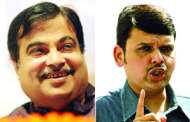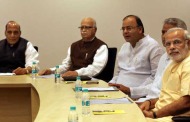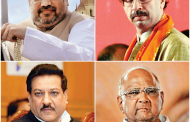Diwali parties have already begun in Bollywood. Shilpa Shetty recented hosted a bash at her residence with her husband and invited her industry friends along. There was much fanfare and cheer at the party. But what struck us as shockingly ugly was her attire. Shilpa was surely having a bad fashion day.
To dazzle like the festival of lights, Shilpa chose eye-soar attire. She donned a block colour kurta and paired it with a skirt and pants. Now the orange of her kurta was too shocking for the occasion. She definitely shocked a few of her guests. Plus, the skirt hugged her fab figure in an unflaterring.
As for accessories, Shilpa went for two beaded necklaces in red and white which only made her look gaudy. Well, guess Shilpa didn’t anticipate such a mismatch with her outfit.
Grishma Teli, vice-president, research and development, Ecotrail, said only extracts from vegetables and fruits are used in the cosmetics products manufactured at the company’s unit in Sanand. “The source of every ingredient is researched and it is ensured that products are 100% free of non-halal ingredients such as alcohol, chemicals like sulfate, paraben and mercury and animal-derived inputs,” she said.
India is home to the world’s second largest Muslim population but the community is still highly untapped as a consumer market for cosmetics products. Mauli Teli said that India’s personal care market is growing at 15-17% every year. “Ecotrail is currently focusing only on meeting the domestic demand,” she said.
2014 is witnessing unprecedented sales of various consumer good products all over the country. And the good news is that both ecommerce and brick-and-mortar stores are witnessing excellent sales volume.
The hottest products in demand this year are: Gold; Smartphones, LED TVs and Two Wheelers.
An overview of the biggest selling consumer products this Diwali:
– Managing Director of Fab India, William Bissell said that their retail chain witnessed 31% more sales this year Diwali, compared to last year. Ethnic garments and furnishing, both are in huge demand.
– Vineet Jain, Vice President for Big Bazaar said that the last weekend was statistically the best ever in terms of Diwali sales in NCR region. People lapped up exciting offers from FMCGs and the rush was phenomenal, even with their own standards.
– Ajit Joshi, CEO of Infiniti Retail (TATA Group) said that despite sensational offers from ecommerce portals, their stores witnessed huge volume of sales of electronics products such as LEDs and Smartphones. He contributed to this huge sale to companies such as LG, Sony and Samsung who have come out against the practice of offering products at lower than MRP cost.
– Besides smartphones, large applications such as frost-free refrigerators and entertainment products like televisions and home theatres also witnessed excellent sales in Infiniti Retail.
– Sunil Nayyar, head of sales for Sony India, said that demand for flat-screen large televisions of 42-56 inches contributed 50-55% of overall sales of Sony India; and most of them were bought from offline retail. 40-50% more sales were witnessed by Sony India this year, compared to last year. He shared that on a normal day, around 400-500 LEDs are sold in a day in Delhi-NCR region, but on Dhanteras occasion, the number zoomed ahead to 3000-3500 units. He is expecting this record sale trend to continue till New Year.
– Sanjeev Agarwal, VP (sales) at LG Electronics India said that their company witnessed unprecedented sales of washing machines, LEDs and refrigerators, especially in the markets of Delhi, Rajasthan and Bihar. He expressed his happiness in the fact that several of their dealers in remote towns in these states have already declared that their entire stock of the year has finished as of now. In Lucknow, their dealers hired more than 300 vehicles to deliver electronics products all over the city.
– Manish Sharma, MD of Panasonic’s India and South Asia operations has expressed his excitement over the tremendous buzz around electronics goods in general. He has stated that a stable government and clear economic policies is the result of this euphoric ambiance.
– Shital Mehta, CEO at Pantaloons Fashion said that sales increased 10% this Diwali, compared to last year. And on weekend, the sale increased more than 30%.
– Gold has made a grand comeback this year, as in 2013, Government had increased import duty by 15% to stop import of Gold as it was causing trouble for the foreign reserves. But as no such increase was announced this year, buyers are back in the market.
– Rahul Gupta, CEO of popular PP Jewellers in New Delhi said that they are expecting 20% more sale of Gold ornaments this year, compared to last year. Gold was trading at Rs 27,000 for 10 grams in Delhi during Dhanteras yesterday.
– N. Anantha Padmanabhan of NAC Jewellers in Chennai said that they are expecting 10% more footfall and sale this year as market sentiments are at all time high.
– Hero MotoCorp, which is India’s largest two-wheeler maker said that they witnessed record sale of 1.5 lakh units on Dhanteras (yesterday), as compared to 15-20k units on an average day.
– Rakesh Srivastava, senior VP at Hyundai India said that they have witnessed 8100 units of sale on Dhanteras, whereas on a normal day, around 1000 units are sold. Overall, this Diwali, they saw a record rise of 19% in sales of their cars.
– Maruti refused to share the exact numbers, but have confirmed that sales were pretty strong this year, compared to last year’s Diwali.
Olympic and Paralympic sprinter Oscar Pistorius started his five-year jail sentence on Tuesday for killing his girlfriend Reeva Steenkamp, marking the end of a trial that has gripped South Africa and millions around the world.
His uncle, Arnold Pistorius, indicated he would not appeal.
As judge Thokozile Masipa gave her decision on the 27-year-old’s culpable homicide conviction, Pistorius, whose downfall has been likened to that of American football star O.J. Simpson, stood resolutely in the dock.
His only reaction was to wipe his eyes before two police officers led him to the holding cells beneath the High Court in the heart of the South African capital.
Ninety minutes later, an armored police vehicle carrying Pistorius – still dressed in dark suit, white shirt and black tie – left the building through a throng of reporters toward Pretoria Central Prison, where he is expected to serve his time.
Once the execution site for opponents of South Africa’s former white-minority government, the jail is now home to the country’s most hardened criminals, including the man known as “Prime Evil”, apartheid death squad leader Eugene de Kock.
Prisons officials said Pistorius, whose lower legs were amputated when he was a baby, would be housed in a separate and secure hospital wing of the massive complex.
“ONE LAW FOR ALL”
In delivering her decision, 67-year-old Masipa stressed the difficulty of arriving at a decision that was “fair and just to society and to the accused”.
She also rebuffed suggestions that Pistorius – a wealthy and influential white man – might be able to secure preferential justice despite the “equality before law” guarantee enshrined in the post-apartheid 1996 constitution.
“It would be a sad day for this country if an impression were created that there is one law for the poor and disadvantaged, and one law for the rich and famous,” she said.
Steenkamp, a 29-year-old law graduate and model, died almost instantly on Valentine’s Day last year when Pistorius shot her through a locked toilet door at his luxury Pretoria home.
Prosecutors pushed for a murder conviction, but the athlete maintained he fired in the mistaken belief an intruder was hiding behind the door, a defense that struck home in a country with one of the world’s highest rates of violent crime.
The ruling African National Congress’ Women’s League, which is at the forefront of political efforts to tackle violence against South African women, on Tuesday called for an appeal by the state against the Sept. 12 culpable homicide conviction.
But Steenkamp’s family said it was satisfied with the sentence.
“Justice was served,” family lawyer Dup De Bruyn told reporters outside the court. The judge had given “the right sentence”, he said.
“DARK AGES” GONE
With no minimum sentence for culpable homicide, South Africa’s equivalent of manslaughter, Pistorius could have been punished with a few years of house arrest combined with community service.
Before the decision, protesters picketed outside the court, a sign of the anger that might have ensued and the damage that might have been done to an often-criticized judicial system if the sentence were seen as too light.
“Why are certain offenders more equal than others before the law?” said protester Golden Miles Bhudu, dressed in orange prison garb and wrapped in chains as he ridiculed Pistorius’ retching and crying during the seven-month trial, the first in South Africa to be broadcast live throughout.
“He screams like a girl, he cries like a baby but he shoots like a soldier,” Bhudu said.
However, Masipa pointed to the moral and philosophical changes South Africa has undergone since the end of white rule and the 1994 election of Nelson Mandela, saying the courts were no longer about mob justice and an “eye-for-an-eye”.
“As a country we have moved on from the dark ages,” she said. “Society cannot always get what they want because courts do not exist to win popularity contests.”
Many ordinary South Africans were unimpressed, especially after Pistorius’ defense lawyer, Barry Roux, said he expected the athlete to serve only 10 months of the five-year sentence behind bars, and the remainder under house arrest.
“They are only scaring him with this sentence. It shows our society hasn’t transformed,” said Johannes Mbatha, a 38-year-old minibus taxi driver waiting at a Johannesburg bus station.
“If it was a black man he would have never received such a light sentence. But that’s how things are in South Africa.”
In Steenkamp’s home town of Port Elizabeth, a handful of family friends at a bar owned by her parents raised their hands in recognition of the five-year sentence.
“I thought he would walk,” said 50-year-old Martin Cohen, who worked as a race horse trainer with Steenkamp’s father, Barry, who suffered a stroke shortly after his daughter’s killing.
The state prosecuting authority, which has two weeks to decide whether to launch an appeal against the verdict, said Pistorius was likely to serve at least a third of his sentence in prison or 20 months.
On a separate conviction for firing a handgun in a packed Johannesburg restaurant, Pistorius was given a three-year suspended sentence.
Even if he is freed early, Pistorius will not be able to resume his athletics career until his full term is served, the International Paralympic Committee said, ruling out any appearance at the 2016 Rio Olympics.
Known as “Blade Runner” because of his carbon-fibre prosthetics, Pistorius became one of the biggest names in world athletics at the London 2012 Olympics when he reached the semi-finals of the 400m race against able-bodied athletes.
Olympic and Paralympic sprinter Oscar Pistorius started his five-year jail sentence on Tuesday for killing his girlfriend Reeva Steenkamp, marking the end of a trial that has gripped South Africa and millions around the world.
His uncle, Arnold Pistorius, indicated he would not appeal.
As judge Thokozile Masipa gave her decision on the 27-year-old’s culpable homicide conviction, Pistorius, whose downfall has been likened to that of American football star O.J. Simpson, stood resolutely in the dock.
His only reaction was to wipe his eyes before two police officers led him to the holding cells beneath the High Court in the heart of the South African capital.
Ninety minutes later, an armored police vehicle carrying Pistorius – still dressed in dark suit, white shirt and black tie – left the building through a throng of reporters toward Pretoria Central Prison, where he is expected to serve his time.
Once the execution site for opponents of South Africa’s former white-minority government, the jail is now home to the country’s most hardened criminals, including the man known as “Prime Evil”, apartheid death squad leader Eugene de Kock.
Prisons officials said Pistorius, whose lower legs were amputated when he was a baby, would be housed in a separate and secure hospital wing of the massive complex.
“ONE LAW FOR ALL”
In delivering her decision, 67-year-old Masipa stressed the difficulty of arriving at a decision that was “fair and just to society and to the accused”.
She also rebuffed suggestions that Pistorius – a wealthy and influential white man – might be able to secure preferential justice despite the “equality before law” guarantee enshrined in the post-apartheid 1996 constitution.
“It would be a sad day for this country if an impression were created that there is one law for the poor and disadvantaged, and one law for the rich and famous,” she said.
Steenkamp, a 29-year-old law graduate and model, died almost instantly on Valentine’s Day last year when Pistorius shot her through a locked toilet door at his luxury Pretoria home.
Prosecutors pushed for a murder conviction, but the athlete maintained he fired in the mistaken belief an intruder was hiding behind the door, a defense that struck home in a country with one of the world’s highest rates of violent crime.
The ruling African National Congress’ Women’s League, which is at the forefront of political efforts to tackle violence against South African women, on Tuesday called for an appeal by the state against the Sept. 12 culpable homicide conviction.
But Steenkamp’s family said it was satisfied with the sentence.
“Justice was served,” family lawyer Dup De Bruyn told reporters outside the court. The judge had given “the right sentence”, he said.
“DARK AGES” GONE
With no minimum sentence for culpable homicide, South Africa’s equivalent of manslaughter, Pistorius could have been punished with a few years of house arrest combined with community service.
Before the decision, protesters picketed outside the court, a sign of the anger that might have ensued and the damage that might have been done to an often-criticized judicial system if the sentence were seen as too light.
“Why are certain offenders more equal than others before the law?” said protester Golden Miles Bhudu, dressed in orange prison garb and wrapped in chains as he ridiculed Pistorius’ retching and crying during the seven-month trial, the first in South Africa to be broadcast live throughout.
“He screams like a girl, he cries like a baby but he shoots like a soldier,” Bhudu said.
However, Masipa pointed to the moral and philosophical changes South Africa has undergone since the end of white rule and the 1994 election of Nelson Mandela, saying the courts were no longer about mob justice and an “eye-for-an-eye”.
“As a country we have moved on from the dark ages,” she said. “Society cannot always get what they want because courts do not exist to win popularity contests.”
Many ordinary South Africans were unimpressed, especially after Pistorius’ defense lawyer, Barry Roux, said he expected the athlete to serve only 10 months of the five-year sentence behind bars, and the remainder under house arrest.
“They are only scaring him with this sentence. It shows our society hasn’t transformed,” said Johannes Mbatha, a 38-year-old minibus taxi driver waiting at a Johannesburg bus station.
“If it was a black man he would have never received such a light sentence. But that’s how things are in South Africa.”
In Steenkamp’s home town of Port Elizabeth, a handful of family friends at a bar owned by her parents raised their hands in recognition of the five-year sentence.
“I thought he would walk,” said 50-year-old Martin Cohen, who worked as a race horse trainer with Steenkamp’s father, Barry, who suffered a stroke shortly after his daughter’s killing.
The state prosecuting authority, which has two weeks to decide whether to launch an appeal against the verdict, said Pistorius was likely to serve at least a third of his sentence in prison or 20 months.
On a separate conviction for firing a handgun in a packed Johannesburg restaurant, Pistorius was given a three-year suspended sentence.
Even if he is freed early, Pistorius will not be able to resume his athletics career until his full term is served, the International Paralympic Committee said, ruling out any appearance at the 2016 Rio Olympics.
Known as “Blade Runner” because of his carbon-fibre prosthetics, Pistorius became one of the biggest names in world athletics at the London 2012 Olympics when he reached the semi-finals of the 400m race against able-bodied athletes.
Amidst calls by several BJP MLAs in Maharashtra for Union minister Nitin Gadkari to be made the state’s chief minister, the senior leader today said he was happy working at the Centre.
“I am happy in Delhi,” Gadkari told reporters here when asked whether he intends to return to state politics.
Gadkari’s comment came after Maharashtra BJP president Devendra Fadnavis, considered to be the front-runner for the post of chief minister, today visited him at his residence in the Mahal area of the city to wish him on Diwali.
The visit, described as a courtesy call by Fadnavis, lasted for about half-an-hour, according to sources.
After the meeting, the Union Transport and Shipping Minister told reporters, “Fadnavis is my colleague and came to meet me on Diwali.” However, what transpired during the meeting of the two leaders was not known.
Gadkari had earlier clarified his stand about not returning to state politics, saying it was for the the BJP’s central leadership to decide and that he would accept any responsibility given to him by the party. Party sources said that the central leadership favours Fadnavis for the top post.
Fadnavis, who was accompanied by city Mayor Pravin Datke, declined to comment on his meeting with Gadkari. He had also remained tight-lipped yesterday when PTI contacted him for his comments on the Vidarbha MLAs supporting Gadkari for the chief minister’s post.
A group of 39 newly-elected BJP MLAs from Vidarbha region had met Gadkari here on Tuesday and pushed for him to be made the Maharashtra chief minister.
Nagpur-East MLA Krishna Khopde had yesterday offered to quit and vacate his seat to pave the way for his mentor Gadkari. Later, two more MLAs — Sudhakar Kolhe (Nagur-South) and Sameer Meghe (Hingana) — too, offered to resign from their respective seats for the Union minister.
Also, five independent MLAs — Vinayak Patil (Ahmednagar), Shirish Choudhary (Amalner), Ganpat Gaikwad (Kalyan-East), Mahesh Landge (Bhosari) and Ravi Rane (Badnera) — yesterday met Gadkari and Fadnavis separately to offer their support if the chief minister is chosen from the Vidarbha region.
May the festival of lights be the harbinger of joy and prosperity. As the holy occasion of Diwali is here and the atmosphere is filled with the spirit of mirth and love, here’s hoping this festival of beauty brings your way, bright sparkles of contentment, that stay with you through the days ahead.
Best wishes on Diwali and New year.
MUMBAI: Hyderabad-based MIM on Sunday made its maiden entry into the Maharashtra assembly pocketing two seats, while pro-Marathi MNS of Raj Thackeray was all but wiped out winning just one.
MUMBAI: In a turn of events, Hyderabad-based MIM on Sunday made its maiden entry into the Maharashtra assembly pocketing two seats, while pro-Marathi MNS of Raj Thackeray was all but wiped out winning just one.
Lok Sabha MP Asaduddin Owaisi’s Majlis-e-Ittehadul Muslimeen’s candidates won Aurangabad Central and Byculla seat in Mumbai defeating Shiv Sena and BJP nominees respectively.
Former journalist Imtiyaz Jaleel trounced Sena’s former MP and ex-mayor Pradeep Jaiswal by about 20,000 votes in Aurungabad Central as Warish Yusuf Pathan beat BJP’s Madhukar Chavan by 1,357 votes in Byculla.
Akhil Bhartiya Sena’s Geeta Gawli, daughter of mafia don-turn-politician Arun Gawli, was also in the fray in Byculla and Shiv Sena had declared it will not field a candidate against her.
MIM had fielded 24 candidates in the poll for the 288-member Maharashtra Assembly.
While “outsider” MIM made hay, Raj Thackeray’s MNS, which many felt would be the X-factor in the poll, faced its worst drubbing.
Of the 219 candidates fielded by MNS, only SB Sonavane won from Junnar beating Shiv Sena’s AD Buchke by around 17,000 votes.
MNS had won 13 seats in the 2009 assembly election.
BJP Parliamentary Board today meet to discuss government formation in Maharashtra, Haryana. This Parliamentary board secretary Jagat Prakash Nadda announced after the meeting that Home Minister Rajnath Singh will visit Mumbai as the BJP observer for Maharashtra to decide the name of new Chief Minister. Urban Development Minister Venkaiah Naidu will be the observer for Haryana.
Party National Vice President Dinesh Sharma will accompany Mr Naidu while party General Secretary Jagat Prakash Nadda will accompany Mr Singh. This was announced by Parliamentary board secretary Jagat Prakash Nadda after the meeting of Parliamentary Board in New Delhi this evening.
The Meeting convened to decide on the formation of government in Maharashtra and Haryana was chaired by BJP President Amit Shah and attended by Prime Minister Narendra Modi, Home Minister Rajnath Singh, External Affairs Minister Sushma Swaraj, Finance Minister Arun Jaitley, Rural Development and Road Transport Minister Nitin Gadkari among others.
Modi wave still continues to influence voters: Amit Shah
BJP today asserted that Narendra Modi wave still continues to influence voters. Addressing a press conference in New Delhi, party president Amit Shah said, the results of Haryana and Maharashtra Assembly polls have given a seal of approval on the work of Modi government during the four months at the Centre. He said BJP is going to form government in both the states and Chief Minister in Maharashtra will be from the Party.
Terming the victory in the two states as historic, Mr Shah said that it is set to win 49 seats in Haryana and 121 seats in Maharashtra. He said, the party has never contested elections on so many seats in the states. Shah also said, that party’s vote share has gone up from nine per cent to over 33 per cent in Haryana and from 14 percent to about 28 percent in Maharashtra. BJP President said, the Congress has been relegated to third position and it is not even in a position to get the post of Leader of Opposition in the assemblies.
On breaking up alliance with Shiv Sena, Mr Shah said that BJP respects its allies and it never broke the alliance with Shiv Sena. He said, Shiv Sena is still part of NDA government at the Centre.
The 2014 Maharashtra State Assembly Election Results has surely excited political experts with a tough tussle among the top parties to form the government. The Narendra Modi wave was expected to get BJP a record number of seats in this election, and as per trends it rightly did. But despite over a 100 seats (as per trends), BJP finds itself in a soup needing the help of another major party in the state – Shiv Sena, Congress or NCP to form the government. However, among the likely winners in this year’s elections, there have also been some shock defeats.
Here is Narayan Rane: The Indian National Congress (INC) leader Narayan Rane became the first big name in this year Maharashtra Assembly election to face a shocking defeat. Contesting from Kudal, he lost to Shiv Sena’s Vaibhav Naik by over 9,000 votes. One of Prithviraj Chavan’s biggest critics, Rane had previously served as the Maharashtra chief minister when he was with Shiv Sena in the 1990s.a look at the top 5 wins/losses in the 2014 Maharashtra elections so far.
.
Prithviraj Chavan: Former Maharashtra chief minister Prithviraj Chavan registered a massive win from Karad (south) defeating seven-time legislator and Congress rebel Vilaskaka Undalkar Patil. The anti-incumbency wave has hit Congress big time this election. Parting ways with NCP and taking digs at long-time allies hasn’t helped their image. However, the win will come as a huge relief.
Ajit Pawar: If Prithviraj Chavan won at Karad, his arch-rival from NCP Ajit pawar too followed up with a win soon from Baramati. Pawar had won from the same constituency thrice earlier and things went of easily on the election result day for the strongman of NCP. Rashtriya Samaj Paksha candidate Mahadeo Jankar offered some challenge, but Pawar comfortably registered his fourth consecutive assembly win from Baramati.
Abu Azmi: Maharashtra president of Samajwadi party Abu Azmi won yet another assembly election from Mankhurd Shivaji Nagar. This was his seventh win in the Maharashtra Assembly election. Azmi came under serious criticism following ill-statements against women and orthodox ideologies towards crime like rapes. Yet, the win proves that Azmi continues to enjoy the support of the people of his constituency.
Devendra Fadnavis: The BJP Maharashtra President Devendra Fadnavis, contesting from Nagpur North-West constituency won with the projection of a Clean Maharashtra campaign. NCP’s old timer Dilip Pankule too was also in the fray, but could do little to make Fadnavis swaet over his chances of winning the seat to the assembly.
| Party | Lead | Win | Total |
| BJP | 0 | 122 | 122 |
| Shivsena | 0 | 63 | 63 |
| Congress | 0 | 42 | 42 |
| NCP | 0 | 41 | 41 |
| MNS | 0 | 1 | 1 |
| Others | 0 | 19 | 19 |















Recent Comments